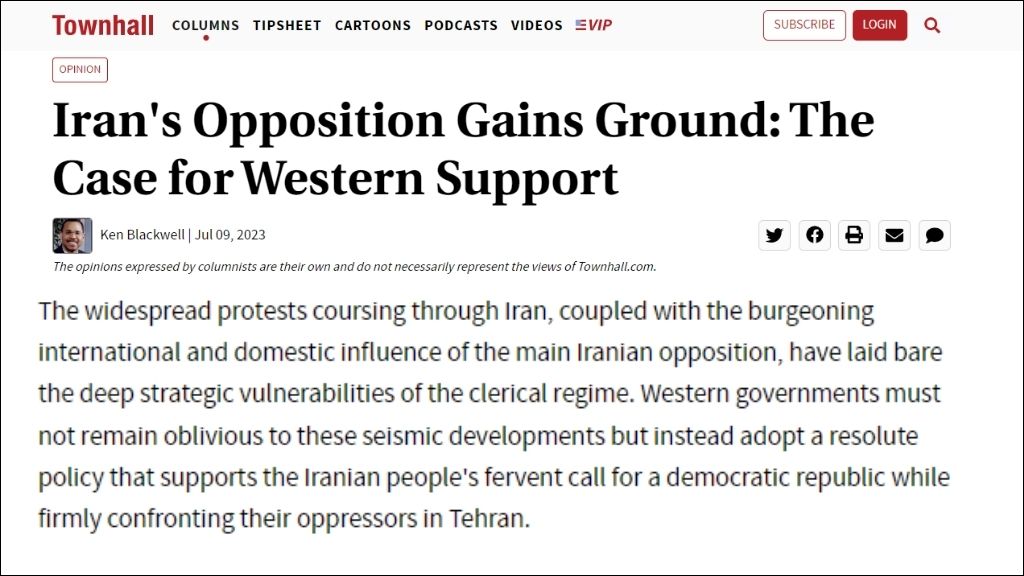Iran’s Opposition Gains Ground: The Case for Western Support

The widespread protests coursing through Iran, coupled with the burgeoning international and domestic influence of the main Iranian opposition, have laid bare the deep strategic vulnerabilities of the clerical regime. Western governments must not remain oblivious to these seismic developments but instead adopt a resolute policy that supports the Iranian people’s fervent call for a democratic republic while firmly confronting their oppressors in Tehran.
The mullahs have been grappling with an intractable challenge as they resort to violent suppression to quell the nationwide protests that erupted last September. Though experiencing occasional fluctuations, the protests continue to pose insurmountable strategic obstacles for the faltering theocracy. Popular discontent has reached unprecedented levels, and the mullahs find themselves teetering on the precipice of collapse. It is in this precarious state that the regime has launched an all-out offensive against the main opposition, epitomized by the Mujahedin-e Khalq (MEK) and the democratic coalition of the National Council of Resistance of Iran (NCRI).
Since the eruption of the uprising, the regime has intensified its campaigns of misinformation against the opposition while desperately attempting to persuade Western governments to act against the NCRI/MEK. However, the urgency for Western governments to reckon with the opposition’s remarkable international gains becomes all the more apparent.
In a landmark display of solidarity, over 500 renowned figures from across the globe, including 2024 US presidential candidate Mike Pence, a dozen sitting members of the US Congress, as well as former presidents, prime ministers, ministers, and current parliamentarians, converged at the Free Iran World Summit 2023: Onward to the Democratic Republic in France at the beginning of July. Their enthusiastic support for NCRI President-elect Maryam Rajavi’s visionary 10-Point Plan, which calls for a secular, free, and democratic republic upholding the rights of women and minorities, was unprecedented.
That support has gained momentum in recent months. In June, 120 world leaders united in signing a letter expressing solidarity with the NCRI and the uprisings in Iran.
Maryam Rajavi’s resounding message resonated powerfully in the European Parliament, while a Congressional Hearing in the US House of Representatives facilitated crucial engagement between policymakers and representatives of the resistance. Notably, over 3,600 lawmakers from more than 40 countries, including substantial majorities in the US, UK, and French legislative bodies, have signed declarations of support for the NCRI’s blueprint for a future in Iran.
At the domestic level, the Iranian resistance movement continues to make significant strides despite the regime’s crackdown and wave of executions. In a remarkable show of defiance, the Free Iran rally in Paris witnessed over 10,000 Resistance Units sending messages of unwavering determination for regime change.
In her address to the July 1 rally, former UK Prime Minister Liz Truss admonished the West for its “appeasement” of the Iranian regime. Her timely remarks resonated as both the French government and Albania, home to the MEK’s headquarters at Ashraf 3, took concerning steps to curtail the opposition movement. France initially announced the banning of the Free Iran rally, a decision that was later overturned by the courts, underscoring its flawed nature. Meanwhile, Albania deployed 1,200 police officers to exert pressure on the MEK, resulting in the tragic loss of life and numerous injuries.
The four-day Free Iran Summit, with its enriching conferences, debates, and the powerful central Paris rally attended by tens of thousands of Iranian dissidents, dealt a severe blow to the regime and the policy of appeasement prevalent in the West.
It unequivocally demonstrated that the opposition and the alternative to the regime have grown stronger and more resilient than ever, both at home and abroad.
The regime’s public condemnation of France following the rally, subsequent to a court victory for the NCRI, epitomized the deep-seated fear of the NCRI and MEK that has been gripping the regime.
As Mike Pence emphasized in his speech at the Free Iran Summit on July 1, “One of the biggest lies the ruling regime has sold to the world is that there’s no alternative to the status quo of tyranny and repression in Iran. But there is an alternative, a well-organized, fully prepared, perfectly qualified, popularly supported alternative called the MEK.”
He added: ” I was proud to join a group of more than 100 former world leaders calling on President Joe Biden and leaders of the European Union to join us in supporting the Iranian resistance and specifically Maryam Rajavi’s 10-point plan.”
The era of appeasing the clerical henchmen in Tehran is rapidly drawing to a close.
An increasing number of international figures are throwing their weight behind the Iranian resistance and the uprising against the ruling theocracy. The prospects of a free, democratic, and secular republic in Iran are within closer reach than ever before.
Western governments must seize this opportune moment and refrain from aiding the mullahs. The winds of change blow stronger than ever, and the time for resolute action is now.
Ken Blackwell is the former U.S. ambassador to the United Nations Human Rights Commission.
- Tags: Iran, Maryam Rajavi, MEK, NCRI, Uprising

